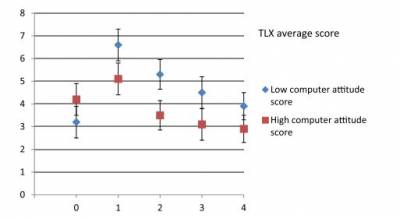New health technology will only deliver if it is well designed. Poor usability can impede adoption, reduce efficiency and even increase risks to patients.
The Problem
Hospitals across the world are moving to electronic health records, but adapting to using any new system can be a challenge. In the high risk environment of medicine, increases in cognitive workload while transitioning to a new system can be dangerous.
Among GPs, poor usability is a common complaint about record systems and increased cognitive workload may impact on user satisfaction, user fatigue, clinical productivity and safety.
Our Research
One of our alumni, Dr Lacey Colligan, led a study in the United States following paediatric nurses on a ward and a neonatal intensive care unit as they coped with the introduction of a new electronic health record system. Even though multiple measures were put in place to ease the transition, including double staffing for two weeks, the study, conducted with Dr Henry Potts and others, saw a large increase in cognitive workload. Such an increase is a cause for concern as it could lead to an increase in errors. It took about ten shifts for cognitive workload to return to baseline.
Nurses adapted to the new system at varying rates, so “one-size-fits-all” training may not be optimal. The study also found that a simple technology attitude score could help predict which nurses struggled most, both in the short and long term (Figure 1, below). Training could thus be targeted based on a simple questionnaire before adoption, or by using simple cognitive workload measures during a “go-live” period.

Figure 1 TLX average scores over time by computer attitude score
Dr Ferran Ariza, a London GP, with Dr Henry Potts and Prof Dipak Kalra, looked at the cognitive demands of GP record systems in the UK, covering the main systems currently in use including:
- EMIS
- SystmOne
- INPS Vision
- iSoft Synergy
- Microtest Evolution
There was no statistically significant difference between the systems, which may come as a relief to the suppliers! However, certain tasks were identified as making greater demands, notably including repeat prescribing. This suggests that there is room for improvement in the design of some aspects of GP systems.
Dr Ariza conducted the study as part of his dissertation for our MSc in Health Informatics. The graduate programme in Health Informatics is popular among GPs as well as many other professional groups (healthcare managers, IT staff, nurses, pharmacists etc.). Students doing the MSc complete a dissertation consisting of a significant piece of research, either using their own research questions or connecting with ongoing research in the UCL Institute of Health Informatics. Several MSc dissertation projects, like Dr Ariza’s, have now been published as research papers.
Themes
- Learning Health Systems
People
- Dr Henry Potts
- Prof Dipak Kalra
Collaborators
- Dr Lacey Colligan
- Dr Ferran Ariza
Publications
Ariza F, Kalra D, Potts HWW (2015). “How do clinical information systems affect the cognitive demands of General Practitioners? Usability study with a focus on cognitive workload,” Journal of Innovation in Health Informatics, 22(4):379-90. doi:10.14236/jhi.v22i4.85
Colligan L, Potts HWW, Finn CT & Sinkin RA (2015). “Cognitive workload changes for nurses transitioning from a legacy system with paper documentation to a commercial electronic health record,” International Journal of Medical Informatics, 84(7):469-76. doi: 10.1016/j.ijmedinf.2015.03.003
 Close
Close

